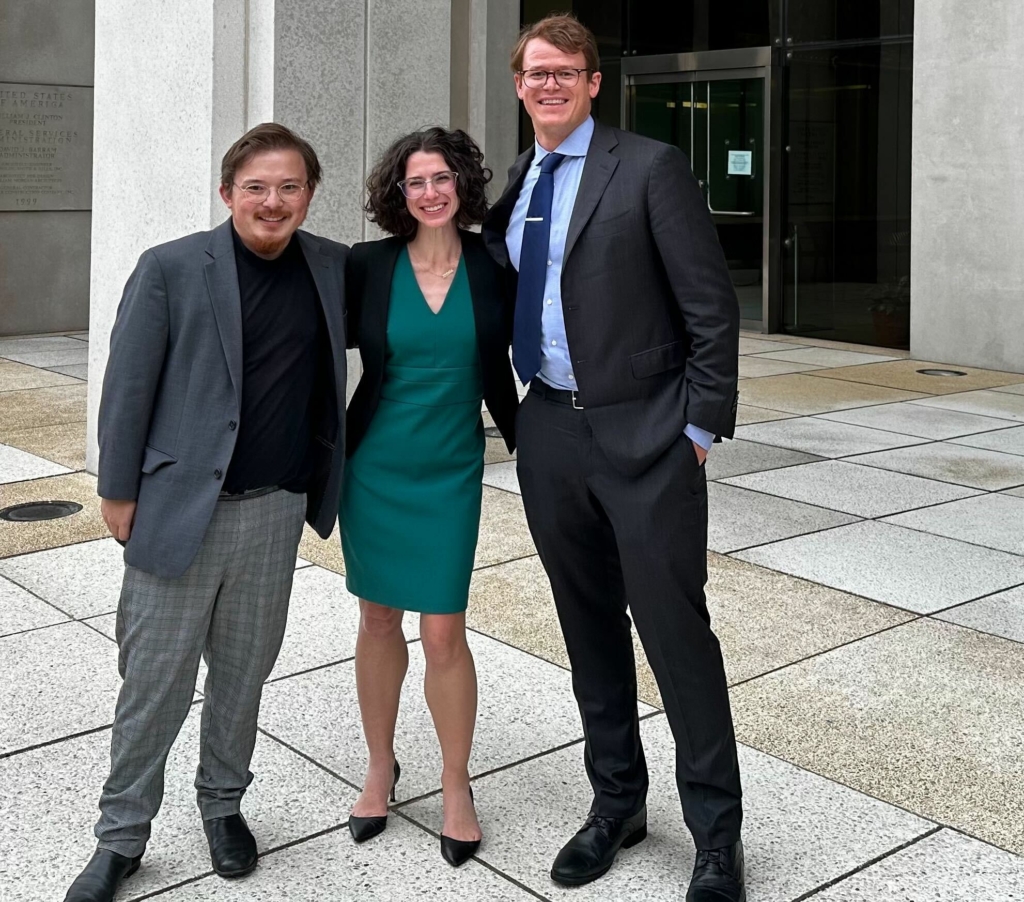TALLAHASSEE, FL (Sept. 29, 2023) – Residents and experts condemned Florida’s 2022 congressional voting maps in federal court throughout the first week of testimony in Common Cause et al v. Byrd.
Southern Coalition for Social Justice, Patterson Belknap Webb & Tyler LLP, the NAACP Office of General Counsel, and Bedell, Dittmar, DeVault, Pillans & Coxe are representing plaintiffs. The plaintiffs include Common Cause Florida, FairDistricts Now, the NAACP Florida State Conference, and a number of individual voters. The plaintiffs argue the map violates the 14th and 15th Amendments of the U.S. Constitution by discriminating against Black voters.

In Plaintiffs’ opening statement to the three-judge panel of the U.S. District Court for the Northern District of Florida, attorney Gregory Baker of Patterson Belknap LLP explained the enacted map not only actively harms Black voters but represents a continuation of Florida’s history of discriminating against Black voters and an unprecedented deviation from redistricting procedures on behalf of Governor Ron DeSantis.
In 2015, the Florida Supreme Court approved a Northern Florida district referred to throughout the trial as “Benchmark CD 5.” It was drawn in order to implement the Fair Districts Amendment (FDA), which voters overwhelmingly approved to prevent legislators from drawing lines favoring political parties or incumbents and to protect minority voting power in Florida. With Benchmark CD 5, Black residents were consistently able to elect their official of choice.
During the 2022 redistricting cycle, although the legislature passed a map that preserved Benchmark CD 5, DeSantis publicly condemned the maps as illegally protecting Black Floridians. He injected himself into the redistricting process by proposing his own maps- the first time a governor had done this in Florida’s history. His map destroyed Benchmark CD 5, erasing the voting power of North Floridian Black voters. Although the legislature passed two other maps- one that addressed DeSantis’ public criticisms of Benchmark CD 5 and one that preserved the district- DeSantis vetoed both.
“Of course, the outcome of these vetoes didn’t protect the rights of Black voters at all,” Baker said in the opening statement. “Rather, Benchmark CD 5 was cracked into four white districts- districts in which Black voters don’t have a chance. Either way the result was the same: for the first time in 30 years, Black voters in Northern Florida were denied the opportunity to elect the candidate of their choice.”
The first day of testimony featured Alex Kelly, DeSantis’ current Chief of Staff and Deputy Chief of Staff during the 2022 redistricting process. Kelly was instrumental in the creation of the governor’s maps.
During his examination, Kelly admitted DeSantis thought the Florida Supreme Court “got it wrong” when it found Benchmark CD 5 was constitutional and that no court supported the Governor’s rogue legal theory that the district violated the Equal Protection Clause.
“So as Florida law stood,” Judge Adalberto Jordan asked. “As interpreted by the Florida Supreme Court in late 2021-early 2022, what the legislature was going was not unconstitutional?”
“Yes, Your Honor,” Kelly answered.
“It was unconstitutional according to Governor DeSantis?” Jordan asked.
“Yes, Your Honor,” Kelly answered.
When Jordan directly asked Kelly about taking into account shared community interests, such as race, history, religion, and culture, along with traditional redistricting criteria when drawing district lines, Kelly responded those shared interests had become a “nebulous thing.”
Kelly also admitted he had no knowledge of Florida’s history of discrimination and didn’t think Black voters faced barriers to casting their vote today.
The judges then heard from Charlie Clark, one of the individual plaintiffs and a longtime resident of Tallahassee. Clark worked at the Florida Department of Agriculture and Consumer Services for 32 years and was the first Black person to serve as the Head of the Department of Agriculture Pesticide Registration Program.
Clark spoke about the character of Rep. Al Lawson, who represented the residents of Benchmark CD 5 during its existence. He said Lawson often organized meetings to hear from his constituents, and went out of his way to meet the specific needs of people who lived in the district’s rural and more urban areas.
Clark said his current representative, Rep. Neal Dunn, has not responded to his requests for a meeting or held community meetings. He said Dunn’s statements and support of legislation Clark and many of his peers disagree with- including the changes to women’s healthcare and rewriting Black history- highlights Dunn’s disconnect from the Tallahassee community.
Overall, Clark said Dunn’s behavior and the redistricting have left a major impact on him and his community.
“I just personally felt that- and a lot of my friends also felt- that [the 2022 redistricting cycle] was a kind of mental, psychological impact,” Clark testified. “I just really felt like it was a vicious assault on what I have come to expect as just a regular voter in Leon County.”
On Wednesday, the judges heard from Dot Inman-Johnson, an individual plaintiff and the first Black woman elected to the Tallahassee City Commission, where she served for a decade, including two terms as Mayor. Inman-Johnson was questioned by Katelin Kaiser, Counsel for Voting Rights at SCSJ. Throughout her long career, Inman-Johnson has worked to help residents struggling with poverty to receive services and is the author of a book addressing the harmful misconceptions of people facing poverty.
Inman-Johnson said the destruction of Benchmark CD 5 took away Black residents’ access to responsive representation. She said Dunn doesn’t understand the residents of Tallahassee- highlighted by his disrespect toward local activist and “Mother of the South Side” Edwina Stephens at a dedication in her honor.
The lived experiences of Inman-Johnson and Clark laid the foundation for expert witness Dr. Morgan Kousser, a famed historian and professor with expertise in voting rights and racial discrimination.
Kousser detailed the long history of racial discrimination in Florida’s election practices- from poll taxes to variations of literacy texts to outright violence in the “Ocoee Riots” during the 1920s and the assassination of state NAACP head Harry T. Moore in 1951. It was in this context of racial oppression that voters passed the FDA to prevent lawmakers from undermining and diluting the power of Black voters.
In 2022, Kousser said the DeSantis administration inserted itself into the redistricting process in many unprecedented ways with the clear and foreseeable effect of the destruction of Benchmark CD 5.
The judges also heard from Amy Keith, Program Director from Common Cause Florida, one of the organizational plaintiffs in the case. Keith explained Common Cause Florida works to create open, accountable government that is of, by, and for the people. She said Common Cause has members all across the state, including in the congressional districts discussed in the trial, but does not share individual member’s information to protect them from threats or hostility.
The trial is set to resume on Monday and is expected to wrap up by Oct. 4.
For live updates from our team in the courtroom, click here.
###
Southern Coalition for Social Justice, founded in 2007, partners with communities of color and economically disadvantaged communities in the South to defend and advance their political, social, and economic rights through the combination of legal advocacy, research, organizing, and communications. Learn more at southerncoalition.org and follow our work on Twitter, Facebook, and Instagram.
Common Cause Florida is a nonpartisan, grassroots organization working for open, honest, and accountable government.

